Seal Network ICO Review - New kid on the Anti-counterfeit Block(chain) looks to be the Real Deal
Seal Network

Webpage https://seal.network
Telegram link https://t.me/sealnetwork
White Paper Link https://seal.network/seal-whitepaper.pdf
Bitcoin Talk link https://bitcointalk.org/index.php?topic=2929809.0
What is Seal?
Its is a Brand and consumer focused anti counterfeiting systems that everyday people will want to use.
Seal will use secure NFC embedded chips synchronized with blockchain technology to allow product authenticity, adding additional value and information about the product, such as product history.
Verification of authenticity is instantaneous with a simple tap or scan with any smart device such as a phone.
Seal is a Dutch company and the NFC chips are manufactured by NXP semiconductors which is also based in the Netherlands.
Video explaining Seal.
How does it work
At the simplest level. You scan a product and it can be verified by secure blockchain.
Brands can charge a variable fee depending on the product and added services and functions the chip provides. This helps fight counterfeiting and the consumer gets to support the designers and brands they love.
On the secondary market, it will be easier to sell your product at a higher price because other people can validate the authenticity. You can also claim an individual product as yours. There will be a small fee for change of ownership and claiming.
So brands can still make a very small cut on the secondary sale of an item and the seller can likely get a better price. Seal also cuts a very small cut of this fee which benefits token holders as a small percent of tokens are burnt with every transaction.
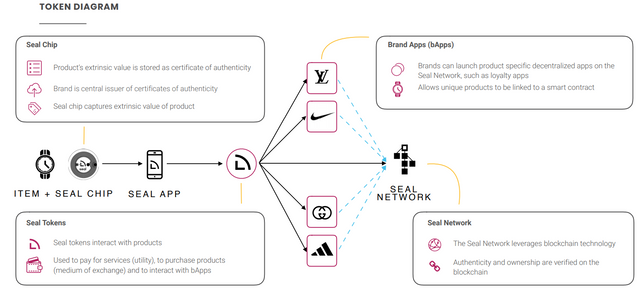
App front end and back end.
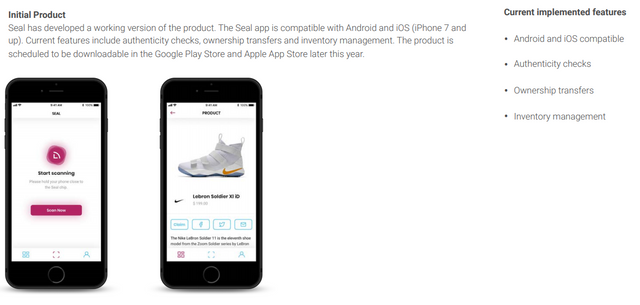
Brands can create their own front end app or use seals native user interface. The app has unlimited applications but the blockchain can only store limited data. Seal already have a working application that can be used for basic functions.
App demo.
Real world applications
Luxury Brands
Seal plans to target luxury brands as a starting point. I think it is a decent starting point as people that buy luxury brands want a guarantee it is 100% the the real deal. I can see real value here for both consumers and luxury brands
Anti theft
Because the chips can be embedded into the product and would require damage to the item to remove, stolen goods would be easy to identify. If you wanted to buy a second hand TV you could easily tap your phone and see if it is listed as stolen or not by the owner.
Lost items
This is just me thinking of other uses here as I am always losing stuff. Say you lose something. Anyone could scan it and find out who the owner might be and there may even be a reward for returning it! As the claimer of the item you could choose to have things like contact email address visible or not.
Third party apps
Again just me thinking of possible uses. Because the blockchain information is public anyone could potentially create and app and use this information to create a new business. They could track all sorts of info that others do not want to. For example an app could be created purely for art or antiques which tracks all the auctions and price history etc etc. Seal does also plan to offer this but there is a chance for other parties to also start their own thing outside Seals scope.
Other uses
Imagine every TV or laptop having one of these chips installed. You can be sure you never buy stolen goods. If the market for stolen goods is reduced this may even reduce burglaries (I am dreaming I know!).
Collectors items and cards
Take baseball cards for example. There is so much history behind these and verifying a fake would be very difficult. If the thin sticker version of the seal chip was embedded between the cards layers the history of that card can be verified instantly without any kind research or specialist info required.
Food and drink
Chips and be embedded into the product in such a way it would be clear it has been tampered with or in such a way the chip will destroy itself when a consumable is opened. For example that expensive bottle of wine.
Medicines
Self explanatory really. This is a major problem in developing countries
The possibilities go on and on really.
The Team
The team has some very encouraging advisers and team members.
You can read more about the team on there website here.
Seal Network team link
The two main team memebers are brothers Bart and Joris.
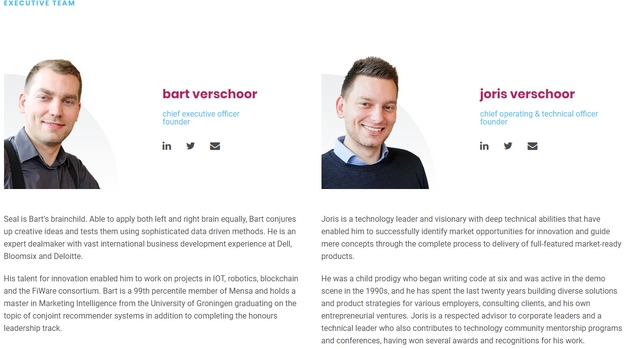
They have two advisers who work at or were involved with NXP semi conductors which shows how close their relationship is with the company they source their chips from.
I have asked many questions on their telegram and they have a stand out team member Michael De Blok who really goes out of his way to answer questions. If he doesn't know the answer he gets back to you.
I have vetted the team to a high standard and I can find no issues or question marks. They have turned up at several blockchain conferences and many people I know have met them in person and talked to them and had good things to say.
The advisers are well known people and from decent brands. DYOR to ensure you cant find something I did not.
What problem are they solving?
We all know the problem of counterfeiting, it is pretty obvious. One out of five products made in China is a fake.
This is a big problem world wide more so in less developed countries. The most concerning being consumables, fake food, medicine and even alcohol.
Expensive spirits which are very popular as a gift in China can command price tags of around $160 USD. I use this as an example as I recently traveled to China was was given such a gift from a friend of mine who is a distributor.
Around 10% of these products are fake. Companies already employ several tricks to beat the fakes. Such as total redesign of the packaging often which is very expensive. QR codes and even other similar inferior RFID technologies that are already hacked and by-passable.
The cost for this company which sells one of the top three white spirits in China says around 10% of their sales or $2.8 billion USD of all sales is lost easy year. That is a huge potential market.
Fake medicines even if they are not harmful can cause deaths because they are not treating the illness. This is a massive problem in developing countries where medicines are hard to come by.
What makes Seals solution better than the rest
Encrypted dynamic chip counter that writes to the chip every time it is scanned which is synced to the blockchain. (this is unique to Seals solution and NFC chips).
Consumable products with chips that are destroyed on use or deactivated once consumed.
NFC chips can be embedded either in glass/other materials or installed in such a way it is destroyed once opened. Other techs can do similar applications but the size, durability and options are much better with NFC.
Dutch company and the NFC chips are manufactured by NXP semiconductors which is also based in the Netherlands.
Already existing working product. Existing brand customers.
Already existing working product (non blockchain version). Existing luxury brand customers. You can find more info on their website
Seal have allocated a large amount of funds and tokens to future developement of a more secure NFC chip.
Seal is an anti counterfeit system that uses NFC (Near Field Communication). They do not require an antenna which are easily damaged and also do not require any power source on the chip.
As long as the chip is not damaged or exposed to the environment the read cycles are unlimited.
The lifetime of the write cycles is around 27 years if you were to write to the chip once per day.
Business Model
Seal is unique in that is trying to add value for the consumer and Brand. The consumer will foot the bill and the brand will set the price of the added value.
For example a designer bag might cost $1000. The cost to claim it on the Seal network is set by the Brand. The brand might set the price for claiming the product anywhere from $2 to $30 for example. The more expensive the luxury brand is and what you can do with a third party app or features will probably set the price for claiming.
In this example the price might be around $15.
The question is would you pay $15 to know the $1000 bag you are buying is 100% genuine? Most people probably would. There could be value added features as well. If you were then buying this bag second hand you could again pay this same fee if you were the buyer to claim the bag as yours. Scanning the bag is free (or there maybe a very small mining fee) and you can verify its authenticity without claiming it if you choose not to.
The first initial purchase the token is not activated until it is claimed. This makes selling items on the secondhand market verifiable.
Every time the item is claimed by a new person they have to pay the fee to do it. Those fees can change, I would like to see an automatic decay feature so it gets cheaper as more people claim it.
Out of that $15, the Brand would take 75% ($11.25) and Seal gets 25% ($3.75). Out of that $3.75 seal burns 5% which would be $0.1875 or around 19 cents worth of seal tokens. Increasing the overall value of seal tokens fractionally. There is also a mining fee in there somewhere but the details on who pays that is yet to be confirmed. Likely the consumer. All of these fees will likely be built into the purchase price.
They also incentivize the use of seal tokens by encouraging people to buy goods using Seal. If you buy with SEAL tokens you can bypassing some traditional fees. Using the above example the fee which includes the cost of claiming the item is ~1.5%. Credit card charges are usually around 3%. This is more a saving for the retailer though than the customer unless they pass those savings on.
Getting seal tokens might involve small fees also depending on how seal plans to implement this. The details have not been worked out yet but there could be savings to both Brands and consumers.
There will be other advantages to buying using seal tokens such as for the seller they will know the money is from a trusted source unless somehow someone stole those tokens from someone.
Seal have also said there will likely be loyalty bonuses if Seal tokens are used to make the transaction.
The cost to the customer to claim a product is likely to be around the 1.5% mark on average.
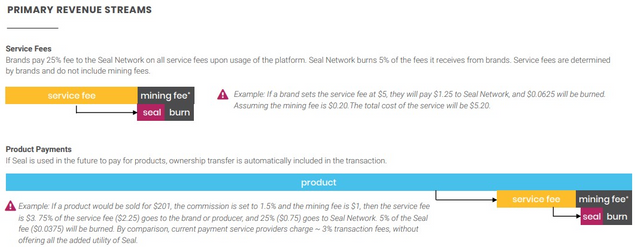
ICO Token Sale and Fund Distribution
Total ICO CAP $33.3 million
ETH price will be pegged at an average price from the 14th March to the 15th April following a delay in the ICO. (check these details yourself as they are not confirmed yet.)
The ICO presale has been confirmed for the 15th of April. The standard prices per token is 8 cents with various conservative bonus prices for early buyers.
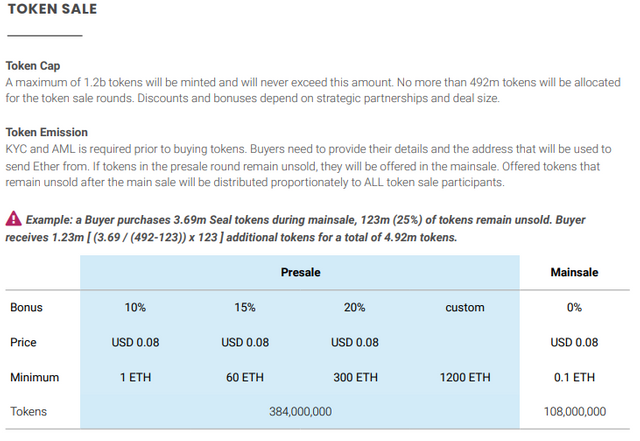
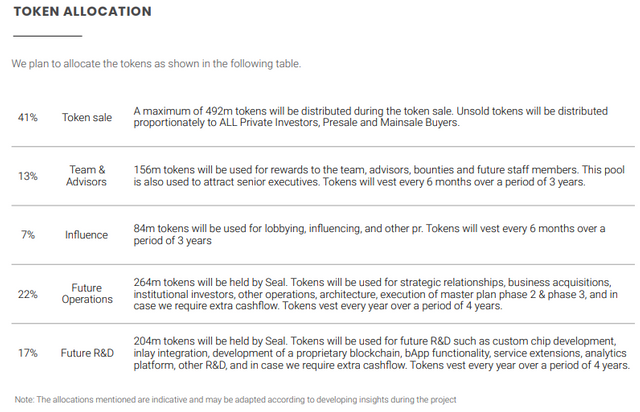
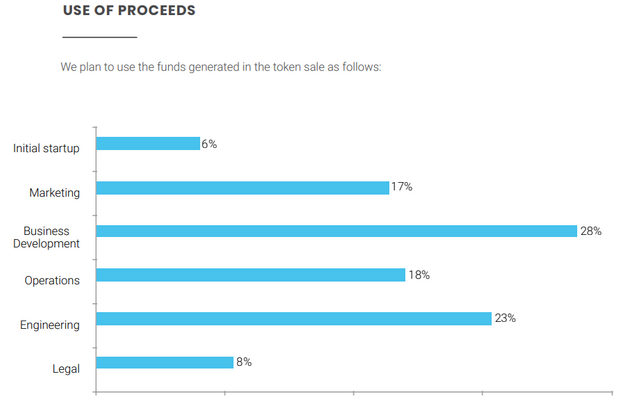
Seal already has a working product, two signed customers ready to go and more in the pipeline. The token metrics leave most of the tokens with seal with 22% for future operations and 17% for future R&D. This is usually a really a bit of a red flag but they are vested and will be unlocked for use in on boarding new brands and customers as well as developing an even more secure chip. New brands will grow the value of the tokens so they should cancel each other out and not have a negative effect on the tokens value once released.
Everything else seems pretty stock standard. In total it is around 41% for the ICO with some tokens for bounties and other influencers. You do need to note that there appears to be heavy private and whale interest from what I can see so there is a chance it may not even make it to the ICO stage.
Bounty and Referral Program
Seal have a bounty program that was just released so I am unsure of the details. Head over to the telegram channel to find out more details. They have also hinted at other incentive programs.
Link to bounty program details.
https://bitcointalk.org/index.php?topic=3217735.msg33455942#msg33455942
Update: Referral Program added. Refer others to get yourself and also the buyer bonus tokens.
https://token.seal.network/referrals
Edit: some were asking for my referral link. I wont post it here but you can find it in the comments section.
Road map
As far as road maps go they do have a lot of stuff coming up soon.
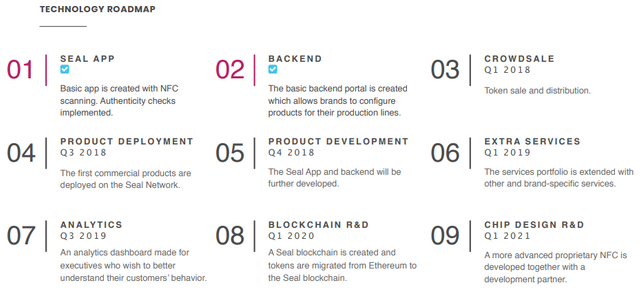
It is split into two which is nice, there is not much going on in Q2 other than brand acquisitions which is the most important part really
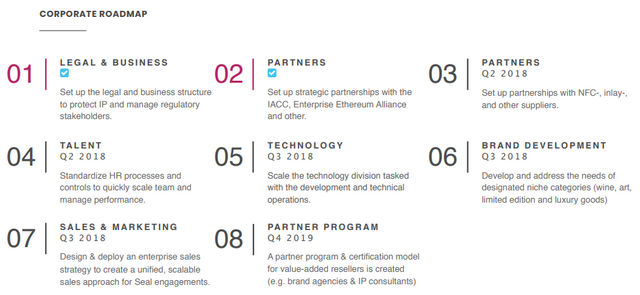
The most important parts are:
- Q2 Setup partnerships with chip suppliers. They say they are under NDA with NXP. They do have two NXP team members as advisers.
- Q2 Hire new team members. They should be doing this as soon as the ICO or pre ICO is over as they will have available funds.
- Q3 2018 they claim is when the first comericial products will be deployed to the seal network. That could 4-7 months away.
Token Usage
• Verify Authenticity
• Register ownership
• Transfer ownership
• Theft-Prevention
• Track Parallel Trade
• Product Recalls
• Product Analytics
• Custom Integration
• Used as a currency to purchase goods
Benefits as a token holder and how Seal makes money
So the question is, why would you want to hold seal tokens?
TLDR
If seal can sign up even small to medium business to generate around 3 billion worth of sales with their chip installed, there is huge value to the token holder. If they can sign up even one big brand the benefit of holding will be multiplied exponentially. This doesn't take into account speculatory rise in price or other reasons other just the pure base math.
Example
Lets use Nike as an example. Can insert any brand or product in here. I used smaller numbers for simplicity. In reality the initial target item will probably be much more high end than $300 but eventually it should make it into the mid range and even lower range products, the fee on the higher range products might be higher but comparable in scale. From the fee paid by the customer 5% of 25% (or 1.25% of the total fee) will be bought by seal and burnt or deleted. This is one of the ways the token can go up in value.
Lets put the 1.25% to the test. Say Nike sells 10 million dollars worth of shoes and each shoe is is worth around $300. They charge a fee for seal of around $10 per shoe. That would be approx 33,333 shoes, or $333,333 total fees from customers. $250,000 (75%) is Retained by Nike (2.5% profit increase for them).
$83,333 goes to seal.
That would mean $4167 of seal burnt (or 5% of 25%)
So $4167 burnt per 10 million dollars of product sold by Brands.
10 million dollars of sales would only burn 0.01251% of the total amount of seal. To get around the same return as having your money in the bank (4167 is 0.01251% of 33,312,000 MC of seal)
They need to be doing a volume of more than 280 x that to be comparable with a money in the bank investment of about 3.5% return. (this varies per country)
This doesn't take into account any of the other things that might increase or decrease the token value. Such as hype and speculation.
So they need to have enough customers to sell around $2,800,000,000 worth of products. It is unlikely they will get this within a year. Perhaps after 1.5 years or 2 years.
In this example the fee cost is around 3% of the original item price. On average I think most will be around 1.5% of the original item price in that case the fee would be around $5. So that would mean 5.6 billion worth of goods need to be sold to reach a reasonable return. You need to adjust it depending on what the fee actually gets set to. Because we are guessing here its hard to say.
Double whatever value you want and token holders are in business.
Nike is a 34 billion dollar industry (n 2016). Here is the 2015 Nike stats. Which shoes shoes were around 65% of their total business.
https://csimarket.com/stocks/segments_anual.php?code=NKE
So fast forward 2-3 years if seal is very successful and it is looking like a very nice token to be holding.
There will be future uses for the token as well. They are also looking at implementing master nodes in the future as the amount of transactions increases. This will require them to move from the ETH blockchain to their own blockchain, which will allow for even more advanced features.
The model looks highly viable as a token holder.
The NFC Technology
This is a bit geeky so you can skip this part if you are not really interested.
Here is a rough breakdown of some of the types of tags and costs. The main chip seal will use will cost around 10-20 cents at medium quantities. These prices are for existing RFID tags but the costs are around the same give or take 10%.

Active RFID tags contain a power source, so they can broadcast a signal, up to 100 meters away. This capability makes RFID a strong choice for asset tracking, but the tags are large and expensive.
Passive RFID tags have no power. They’re activated by an electromagnetic signal sent from the RFID reader. The signal doesn’t travel as far as active RFID, so they’re used for short read ranges. They may require antennas.
For the consumer passive RFID vs NFC doesn't seem to make much difference to how the user reads the tag. The difference is NFC maybe smaller and more robust as well as more secure. Both have read write capabilities but only NFC allows for two way communication using one of two modes: card emulation and peer-to-peer (P2P).
Below is a run down of the technology NFC chips have but may not be in use by Seal yet. Currently the chips will be in Passive mode with dynamic encrypted counter which increased by 1 every time it is scanned.
Other modes and information
Card emulation mode is like when you use contact less payment.
Peer to peer mode is sending information back and forth, you can even transfer files like photos, in peer to peer mode usually both devices will require a power source such as in your phones. The speed is around 2-4 times dial up speed.
For example a NFC chip my have a pass code on it and another device is waiting to receive a pass code. This other device wont try to read the pass code as anyone can read it but it will send it if the correct conditions are met, this is what can make NFC more secure than comparable RFID tech.
The best example would be a card that has money loaded on it, like a bus pass. It requires two way communication to work so the balance of the card can go up and down.
This is only my interpretation of the technology and does not relate to Seal as initially both of these modes will not be active.
What can make NFC more secure is that the NFC chip will hold the information and it can also send this information if the right requirements are met. You cant just read it, it must be sent which is how the information is secured. If we were using RFID anyone could read the information. If condition has to be met before the info is sent by the NFC chip then it makes it much more secure.
The Competition
DYOR as there is just too much for me to cover here.
Vechain
Vechain has a very similar basic concept but a completely different business model. I think both companies can exist in the same space and the brands will decide who they want to use and what model fits their product better. The other main difference is they will be using RFID (currently) and are more focused on a supply chain model and is much more complicated.
They are more about tracking and authenticity where as Seal is more about focusing providing the more secure authenticity, but at the same time adding future value to both the brands and consumers.
There is a lot of Vechain fanboys (including myself) and they attack Seal heavily citing “Vechain has NFC too”. They barely included NFC in any technicals and never really elaborated on NFC. It was just sort of mentioned in passing.
Fast forward to today, the NFC chip manufacturer vechain partnered with has never made NFC chips before. They do not even register in the top 10 chip manufacturers (NXP owns 80% of the market) and their expertise is flexible batteries.
I think vechain has done very well and will continue to do so. But Seal is another chance if you missed out on the Vechain ICO.
Walton Coin
I cant say much about Walton as they never seemed to really know what they were doing with their tech. It seemed initially they were sort of like going to be competition to iota? I am not really sure what they are doing now so DYOR. Again I think Seals business model is vastly different.
Wabi
Wabi is quite similar to seal in some aspects. It is reasonably simple and uses RFID with antennas. It is focused on milk powder and other food and wine products to start with. Their model is not as appealing to consumers and brands as seal as it more just provides consumers with authenticity and focuses on its token's being a currency.
Origin Trail
I don't see these guys as a competitor. I researched them and found it really unclear what their vision is.
From what I could work out origin trail is kinda of like the back end platform and could actually support all of the above. From a security and simplicity level I think its easier to just bypass OT and build your own.
They claim to be focused on tracking from origin (including specifics about the farm it came from etc) to consumer but its really tricky to find out the actually find out how and what from all their documentation at the time I researched it.
Modum
This is more a platform that can interact with IOT devices such as NFC and RFID chips. They are more focused on supply chain and tracking goods from their origin to point of sale and ensure the integrity of the goods. Namely they will use temperature senors to ensure they goods never got above or below certain temperatures. Again I think they are in a different space to seal and could actually work together.
Ambrosus
They are more focused on food and medicine and supply chain. While Seal plans to target fine wines etc they are not really focused here. I see these guys more as a competitor to Modum.
I advise you to look for other competitors as there are some out there. I think there is room for all of them in the in the current environment as the space is so huge and they all focus on different areas.
Seal a Strategic partner with TBWA\Mobile Strategy. Our partner is a unit of Omnicom Group, the world’s largest advertising agency holding company. You may be familiar with their work for Apple.
Seals partnership with NXP is currently under NDA so at the time of writing this I don't have any information about that but you can check on the telegram to see where they are with that. From what they are saying it seems almost like a done deal.
There is a comparison table out there but it doesn't seem finished so I won't post it. The jist of it is that most others are focus solely on supply chain rather than the Brands and consumers and this is seals point of difference. That focus leads to many other options.
Concerns
Seal have had quite a few delays namely because the ICO was just not as ready as they thought it was. I don't see these delays as a big issue as many positive changes have come from the delays and behind the scenes networking has been going.
The small details are missing in many places but these are things that can be changed and ironed out as they go along. Already with the delays I have seen Seal listening to the community and making changes that will be hugely beneficial.
The main concern is, can Seal sign on brands, specifically big name brands. I have no doubt consumers will be all over this. I will be. They are in talks with many companies they can't name but ensure the community they are very exciting and promising. They have named two companies that they have possible confirmed signed deals with. They are small luxury brands to start with and you can find out more info on their telegram as they have posted links to their websites etc. I had not heard of them before but I don't buy those kinds of items but they would be known in many circles of people that are into that kind of thing.
I was unable to find anything linking them to any negative feedback or scam warnings. I did find one FUD article but it seems whoever posted it takes the same generic text and just cut and pastes random ICO names into the same text as it didn't seem to relate back to Seal at all.
Conclusion
I think Seal is a real winner. The business model and technology is much more exciting to the public and brands than the competition. But there is room for all the companies and I think many of them compliment and can work along side each other. The market here is so huge and the potential is a bit overwhelming really.
I really grilled the team in telegram about this one. To the point I annoyed many of the team. I really like the product and wanted answers to some of the things they were doing that didn't make sense to me. In the end they made changes based on the community comments and I got the answers I was looking for.
They are highly active on the telegram which has around 13,000 users and other social media.
So, does the business model make sense? I think so, it could use a bit of refining and fine tuning. I think that will come with time and is not overly important to the big picture.
They are the only company to be using NFC tech and they have the added advantage of being the only company not using Chinese based tech or being a Chinese based company. This may mean it will be harder to penetrate those markets but they are focused on Luxury brands so this would work in their favor to start with.
Can they sign up big ticket clients like shoe and bag makers? Honestly it is the perfect match. Seal provides the best solution for these kind of companies.
Is the business model good and will Brands and customers embrace it? I think its looks promising and offers at least some flexibility and changes can be made once they get feed back from the brands. I think the current model is very reasonable.
If they can do as well as the competition Seal appears to be a good investment and a cool product I would want to use.
Remember do your own research and use my review as a starting point. I cant guarantee every detail is accurate and things are changing and updating all the time. This is also just my interpretation of how it works and I may have some small details wrong but you get the idea.
Great review! Looks to me like it can really challenge vechain with its unique features.
I think there is room for both as they focus on different areas. Vechain is more supply chain where Seal brings something useful to the Brands and Customers.
Also coverd by Suppoman
Yes I saw that. He was sort of middle of the road. Said there is a chance it can go 10x but also a few negatives. He dont think he did his homework as the details were wrong.
ou yeah, I think they will get then in one year for sure.
Re read this just to confirm my confidence in seal! Pre ico starting soon!!
without a doubt the best review on Seal Network i have seen so far!! Have a big stack of ETH ready for this one!
Great review,as always
Is there a referral program link? EDIT: sorry double post.
Well done written review, Evilmonkey. My interview with Michael de Blok will came soon. Hope it will be good and I will be able to provide further information about this awesome project and add another info and put it next to your great post. Good job
Great review Evil. Very thorough as always! Can't wait to see SEAL take off this year
I appreciate this very detailed review. Makes my decision to go in very easy. Thanks for all the hard work.
Such a comprehensive review, well done monkey! I love how they already have a working product and that the token actually has a purpose. I am a firm believer of this project and look forward to investing and seeing it grow.
This review has so much detail thanks heaps.
Evil's reviews are always so detailed! love it